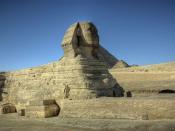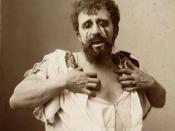In his Poetics, Aristotle outlined the ingredients necessary for a good tragedy, and he based his formula on what he considered to be the perfect tragedy, Sophocles's Oedipus the King. According to Aristotle, a tragedy must be an imitation of life in the form of a serious story that is complete in itself; in other words, the story must be realistic and narrow in focus. A good tragedy will evoke pity and fear in its viewers, causing the viewers to experience a feeling of catharsis. Catharsis, in Greek, means "purgation" or "purification"; running through the gamut of these strong emotions will leave viewers feeling elated, in the same way we often claim that "a good cry" will make one feel better.
Aristotle also outlined the characteristics of a good tragic hero. He must be "better than we are," a man who is superior to the average man in some way.
In Oedipus's case, he is superior not only because of social standing, but also because he is smart he is the only person who could solve the Sphinx's riddle. At the same time, a tragic hero must evoke both pity and fear, and Aristotle claims that the best way to do this is if he is imperfect. A character with a mixture of good and evil is more compelling that a character who is merely good. And Oedipus is definitely not perfect; although a clever man, he is blind to the truth and refuses to believe Teiresias's warnings. Although he is a good father, he unwittingly fathered children in incest. A tragic hero suffers because of his hamartia, a Greek word that is often translated as "tragic flaw" but really means "error in judgement." Often this flaw or error has to do with fate a character tempts fate,


